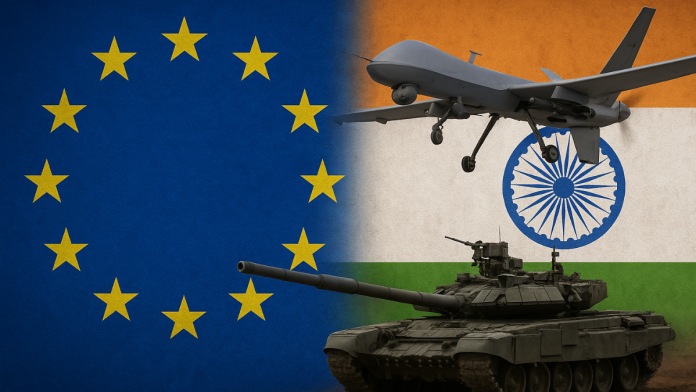The European Union has unveiled its 19th sanctions package against Russia, targeting a total of 45 entities globally. Among these, three companies based in India have been specifically named. The EU claims that these firms have connections to Russia’s military operations. These measures form part of the European nations’ broader strategy to exert economic pressure on Moscow for its ongoing invasion of Ukraine. The sanctions demonstrate the EU’s determination to hold entities accountable for supporting Russia’s war efforts.
Alleged role of Indian firms in bypassing military restrictions
According to the European Union, the three Indian firms are accused of assisting Russia’s military-industrial sector. They allegedly helped in circumventing export restrictions on sensitive goods and technologies. This includes dual-use items, which can serve both civilian and military purposes, as well as high-tech products such as microelectronics and unmanned aerial vehicles (UAVs). Such technologies are vital for modern military operations, and their transfer to Russia is now prohibited under EU regulations.
The sanctions imposed by the EU include freezing the assets of these firms, travel bans for associated individuals, and restrictions on their international business activities. This move underscores the EU’s commitment to preventing the flow of sensitive materials that could strengthen Russia’s military capabilities. While the EU has outlined detailed reasons for these sanctions, it has not revealed the specific names of the Indian companies involved.
Impact on India-Russia business links
While these sanctions target foreign companies connected to Russia, they also have implications for India. Currently, there has been no official response from the Indian government regarding this development. Indian firms doing business internationally now face increased scrutiny, especially in sectors linked to technology and defence.
The sanctions are expected to create challenges for affected companies in terms of international transactions and reputational risk. Banks and businesses that deal with sanctioned entities may have to review their contracts and operations to ensure compliance with EU rules. This is particularly important because violations can lead to heavy penalties and global scrutiny.
Experts point out that this is part of a larger strategy by the EU to isolate Russia economically. By restricting access to critical technologies and business partners abroad, the EU aims to slow down military developments. Companies in other countries have also been sanctioned in recent months for similar activities, showing a coordinated effort to cut off supply chains that benefit Russia’s war efforts.
EU sanctions in crisis as Austria prioritises bank losses over Russia pressure
EU’s broader strategy and global response
The EU sanctions are only one part of a global effort to pressure Russia. The United States, the United Kingdom, and other nations have imposed similar restrictions on businesses and individuals linked to Russian military projects. These coordinated actions are designed to disrupt the flow of essential goods and technology to Russia.
By including Indian companies, the EU sends a strong signal that no country is exempt from scrutiny if its businesses aid Russia’s military-industrial complex. The sanctions are designed to ensure accountability and reduce the risk of illegal technology transfers. International companies now face the challenge of carefully monitoring their supply chains to avoid being caught up in sanctions violations.
The 19th package of EU sanctions reflects a broader pattern of using economic measures to influence global conflicts. It shows how technology, trade, and finance are now tools in modern warfare. Companies in India and around the world are expected to pay close attention to these developments as international rules tighten.
In summary, the EU has imposed significant sanctions on three Indian firms for their alleged support of Russia’s military. While the Indian government has not yet responded, this action underlines the seriousness of global efforts to regulate sensitive technologies and prevent their misuse in conflicts like the war in Ukraine.


